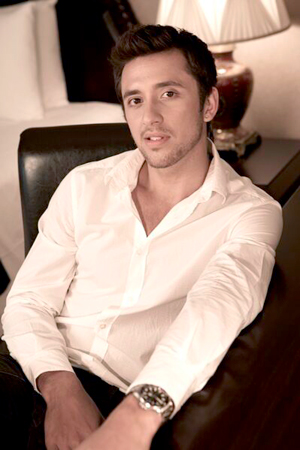
Mohd Azlan Iskandar (all pics courtesy of Mohd Azlan Iskandar)
By Gan Pei Ling | The Nut Graph
BORN on 1 June 1982, Mohd Azlan Iskandar started playing squash when he was eight. He turned professional in 2001 and has won 11 professional titles since then.
The Asian champion is currently ranked 18th in the world. His highest ranking was 11th, in September 2008. The national number one is also setting up his own squash academy soon.
Azlan shared his experience growing up as a Malaysian and a Malaysian athlete with The Nut Graph in an exclusive interview on 15 June 2010 in Petaling Jaya.
TNG: Where are you from?
Mohd Azlan: I was born in Kuching, Sarawak.
Can you trace your ancestry?
My dad was born in Scotland, my grandmother is Scottish and Celtic, and my granddad is Norwegian and also a Viking.
On my mum’s side, my grandfather is half-Indian and half-Malay, and my grandma is Hokkien. So I have a very mixed lineage.
How was growing up like?
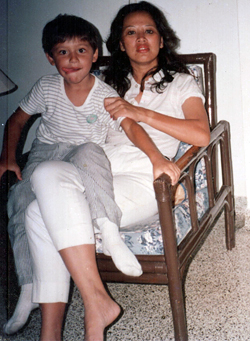
Azlan with his mother, in Kuching
I was one of the 15 squash players selected, and the youngest player as well, to join the Jaya 98 Programme (also known as the Commonwealth Games 1998 Athletes Preparation Programme) sponsored by the National Sports Council (NSC).
It was tough because I moved here when I was 13, on my own. During the first two years, I stayed in an apartment with three other players in Subang Jaya. We had to cook for ourselves and do our own laundry. It was a culture shock for me, and on top of that, my parents were separated at the same time, so I didn’t feel comfortable going back to Kuching. But I would still feel really excited and happy when my mum came to visit me.
I studied in Sekolah Menengah Subang Jaya for two years, and then moved to Bukit Jalil Sports School. Looking back, I think I didn’t really have any school friends. I don’t remember hanging out with them much after school hours because I had to head straight to the training centre. I was so committed to the sport that for me, going to school was just something I had to do, it wasn’t to make friends or socialise. I already knew I wanted to be a professional squash player back then, so I guess my mind set changed.
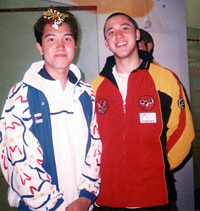
Azlan at Sukma 2002 with ex-national squash player, Timothy Arnold (left)
I moved to England to train when I was 17. (Ong) Beng Hee and I, our budget was limited, so all the money went into squash. I still train there for six months a year now, but when I was 17 till about 24, I spent around 10 months training there.
When did you become aware of race?
Growing up in a private school in Kuching, (if) kid A and kid B were not the same, it didn’t make a difference. I only sensed the difference when I moved to Kuala Lumpur and was put into a government school. There were different cliques in school, and different races would hang out on their own. I was kind of singled out, but I didn’t really care because I was blinded by the love affair with the game.
Did you struggle with your identity as a Malaysian when growing up?
Not at all, I play squash for the country; everything I do is to make Malaysia proud. Sometimes people take you for granted because you’ve been playing for so long, but I guess people also expect me to do well for the same reason. It’s not as easy as people think to stay on top all the time in squash.
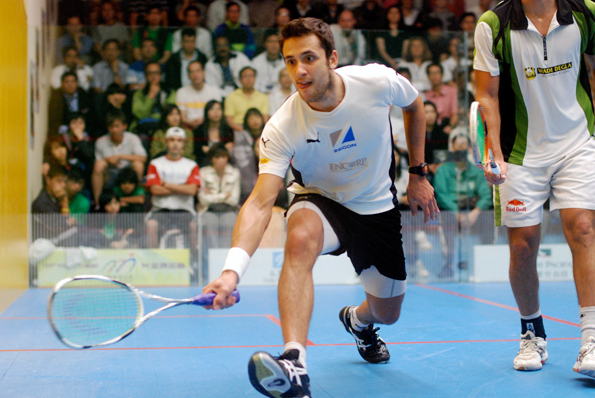
Azlan competing in the Hong Kong Squash Open, 2009
No, except for the fact that I don’t look Malaysian. It’s quite frustrating sometimes, when I’m being served by locals, they speak Malay behind my back. They think I’m a white person and that I don’t know Malay, but I can speak the language fluently.
Describe the kind of Malaysia you would want to see in future.
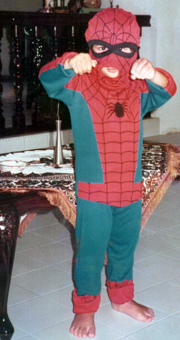
A young Azlan dressing up as Spiderman
I hope the country can produce more world champions in future, with better athlete identification programmes, facilities, and the right funds being channelled into producing quality athletes, and for our athletes to be managed properly.
Right now a lot of athletes are giving up because there are no perks and incentives to stay in the game. Our next generation of squash players are being paid RM400 a month to be full-time athletes. They are living with the bare minimum, and are only surviving because the government subsidises their food and accommodation. If anything, I would like to see a change in this area first.

No comments:
Post a Comment